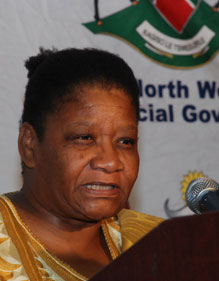|
Getting your Trinity Audio player ready...
|
 Municipalities in North West were hailed by the province’s leadership towards the end of 2012 for meeting auditor-general (AG) Terence Nombembe’s deadline for submitting their financial statements for that year – but what was not revealed at the time was that the achievement came with a R29-million bill for taxpayers.
Municipalities in North West were hailed by the province’s leadership towards the end of 2012 for meeting auditor-general (AG) Terence Nombembe’s deadline for submitting their financial statements for that year – but what was not revealed at the time was that the achievement came with a R29-million bill for taxpayers.
On Wednesday, Mail & Guardian Online reported that it was with the help of private consultants that the financial statements of all 24 municipalities made it in time, along with the backlog from previous years. For years, the province’s local government structures have come under fire from Nombembe for their poor financial management and for not taking seriously their duty to submit to his office.
According to the M&G, the news of the consultants’ involvement angered Premier Thandi Modise, who heard about it during a briefing by the provincial office of the attorney-general. It reported that only five municipalities received unqualified audit reports. Modise is angry that those who are responsible for poor performance are not being held accountable by their municipalities.
In August last year, a joint statement by the province’s departments of finance and local government commended the intervention of both departments in seeing through a turnaround strategy named Operation Clean Audit 2014, which aimed for a clean bill of financial health across all its municipalities.
“We cannot continue to have unflinching commitments and subject ourselves to failure,” local government MEC China Dodovu said at the time. “It is high time we remove all flawed practices and begin to shape to a better direction even if it means naming and shaming those who want us to be painted with the same brush of non-commitment and malicious compliance.”
Municipalities in the North West are no strangers to controversy. Less than a week ago, three of them were put under administration by the provincial executive committee of the legislature. Matlosana, Ditsobotla and Maquassi Hills were deemed dysfunctional in certain areas of their operations, said provincial spokesperson Lesiba Kgwele, and would receive the province’s support to help them recover.
And in the past year, Corruption Watch has received a range of reports detailing allegations of maladministration, nepotism, wasteful expenditure, abuse of power and conflict of interest, among other transgressions in North West.
Shortfalls
In his 2010/11 annual report, the AG noted three shortfalls that were contributing to poor financial management: while officials in key positions lacked the minimum competencies and skills, there was also little political will to beef up key functions to support municipal structures, and a lack of accountability by those who transgressed.
A Special Investigating Unit (SIU) probe in the same year found gross conflict of interest in the Greater Taung and Vryburg municipalities, where officials benefitted from the municipal infrastructure grant, which is given by the National Treasury for infrastructure projects. The SIU investigated six contracts with a total value of R5-million where work was of a poor standard, or no project work was done, despite the businesses being paid. More than 300 employees of another municipality, Madibeng, were found to have collectively made up to R21-million from contracts in the same municipality for which they worked.
According to Corruption Watch statistics, the highest incidence of corruption happens at local government level, with 22% of reports received from the public implicating municipalities.
One report received in late 2012 claimed the mayor of one of the three municipalities under administration had abused her power in a range of cases that included wasteful expenditure, nepotism and irregularities linked to two key infrastructure projects. The anonymous whistle blower claimed that millions were spent on the projects, despite them never taking off, and that an official was unduly fired when he questioned the reasons behind this.
Only 18% of South Africa’s 278 municipalities received clean audit results from Nombembe’s last local government audit, which was done in 2012. He found that municipalities were failing to provide credible and quality information in their financial records. His office conducts annual reports of all municipalities to verify their compliance with the Municipal Finance Management Act (MFMA).
One of the focal areas of Corruption Watch’s 2013 strategy is to expose corruption in small towns. The organisation encourages communities to report corrupt acts through a variety of platforms, including SMS, online, phone or fax. For more details, click here.





